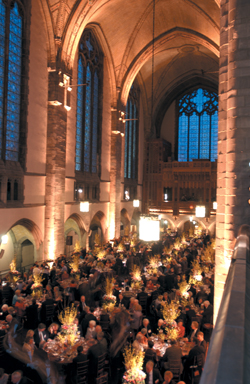 |
|
|
Rise to the occasion In a transformed Rockefeller Memorial Chapel, the University marks its capital campaign’s halfway point to $2 billion.
“Where are the pews?” guests asked, even as they climbed the half-dozen temporary steps to the floor constructed over said seats. That night some 500 alumni and friends would dine in Rockefeller Memorial Chapel, recognizing the cathedral’s 75th year as the University thanked patrons for their contributions, which recently helped Chicago’s five-year, $2 billion capital campaign—the Chicago Initiative—reach its halfway point. The dinner capped off Chicago Convenes, held April 23 to showcase the University’s intellectual wealth. Alumni and supporters attended afternoon faculty panels, including Interdisciplinary Research at Chicago and Social Capital in the Global Metropolis. They joined undergraduate students for a course on Reading Greek Tragedy Today. They got behind-the-scenes looks at the Oriental Institute and Court Theatre. They toured revitalization areas in Hyde Park, Kenwood, and Woodlawn, as well as new or in-progress campus facilities: Ratner Athletics Center, Comer Children’s Hospital, the Interdivisional Research Building (IRB), and the Graduate School of Business (GSB) Hyde Park Center. Before the activities, trustee and Chicago Initiative chair Edgar D. Jannotta announced the campaign news at International House’s Assembly Hall. When he gave the Initiative’s official dollar total as of that day—$1,017,907,261—maroon and white balloons descended onto the celebratory crowd. The money has supported new facilities, 28 new endowed professorships, 92 graduate-study funds, 64 endowed College scholarships, and more than $70 million a year in unrestricted funds for the president’s, provost’s, and deans’ offices. The evening’s dinner also sent spirits soaring. As the sun set outside Rockefeller, the scene inside grew dramatic: spotlights illuminated forsythia centerpieces, whose tall branches echoed the chapel’s vaulted ceiling. A beam shone through the stained-glass cinquefoil chancel window, its primary colors glowing above the 47 tables draped in patchwork-tapestry tablecloths. University of Chicago Medal recipient Marion M. Lloyd called it “the most beautiful setting of any party I’ve ever been to.” Lloyd, 93, became only the tenth medal winner since 1976, when trustees instituted the award to recognize “distinguished service of the highest order to the University...over an extended period of time.” Presenting Lloyd with the award, Jannotta cited her five decades of service, helping to found the Women’s Board in 1960 and to give the Court Theatre a building in 1981. The widow of former Board of Trustees chair Glen Lloyd, JD’23, Marion Lloyd is a life trustee who has known every University president since Robert M. Hutchins. Receiving the gold medal, Lloyd thanked the University for the honor and told the other guests, “I don’t understand why I’m up here when all of you” have supported Chicago as well. In fact, the dinner in Rockefeller also honored donors who have given $1 million or more in cumulative gifts to the University. More than 100 individuals, foundations, and corporations were inducted into the newly coined Founders Circle, receiving replicas of a 1931 bronze bas-relief of Chicago’s first president, William Rainey Harper, that hangs in Swift Hall. Linking million-dollar donors with the founders recalls John D. Rockefeller’s $600,000 pledge to establish the University; he challenged Harper and the city to raise the additional $400,000 needed for that earliest gift, which opened Chicago’s doors in 1890. Fittingly, grandson David Rockefeller, PhD’40, was presented with the initial bronze. Now that the campaign has raised its first billion, the Initiative leadership has focused on the second. Its goals are: another $219 million for the College, including $69 million more in endowed scholarships; $164 million for faculty; at least $170 million for research science, including cancer research, the IRB, and the Computation Institute; $64 million more for the GSB; $50 million for a new Center for the Creative and Performing Arts [see “Bursting at the seams”]; and $50 million for community initiatives, including the Center for Urban School Improvement and the Center for the Study of Race, Politics, and Culture.—A.M.B.
|
|
phone: 773/702-2163 | fax: 773/702-8836 | uchicago-magazine@uchicago.edu


